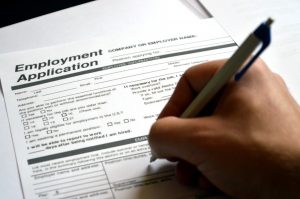One of the key steps in the procedure of getting CRB checks is proving identity. There are a few reasons for this. Firstly, the police and DBS need to make sure that they are looking into the background of the same person. There may be several people living in the UK who share your name, or date of birth. Some of them might have a criminal record as long as your arm, so you don’t want any mix-ups. Secondly, employers have to guard against cases of employment fraud. Is this person really who they say they are? Do they have the right to live and work in the UK? In order to answer these questions and proof your identity, you’ll have to show a range of key identity documents.
CRB Checks Process
 Providing documents is the middle stage of the criminal records checking process. Although we still often talk about CRB checks, these have been replaced by a new body called the Disclosure and Barring Service, or DBS. Any application for a DBS check starts with the application form. Most people choose to do this part online. It’s quicker, you can access the form whenever you like, and the form will highlight fields you have missed. There is still the option of the older paper form if you’d prefer. The next stage is showing your identity and address documents. Usually, your employer will ask you to bring paperwork into the office for checking. They’ll look at your originals, then perhaps take a photocopy for their own records. Finally, the forms are passed to the police forces around the country for searches.
Providing documents is the middle stage of the criminal records checking process. Although we still often talk about CRB checks, these have been replaced by a new body called the Disclosure and Barring Service, or DBS. Any application for a DBS check starts with the application form. Most people choose to do this part online. It’s quicker, you can access the form whenever you like, and the form will highlight fields you have missed. There is still the option of the older paper form if you’d prefer. The next stage is showing your identity and address documents. Usually, your employer will ask you to bring paperwork into the office for checking. They’ll look at your originals, then perhaps take a photocopy for their own records. Finally, the forms are passed to the police forces around the country for searches.
What Documents Do I Need for CRB Checks?
There are two categories of documents needed for DBS checks. This is where it all gets a bit complicated. The DBS try to be as flexible as possible, recognising that we all have different circumstances. Unfortunately, this results in complex instructions such as: one from group one, one from group 1, 2a or 2b, or one from group 2a and two more from group 2 etc. If you are understandably confused, seek advice from either your employer or the DBS. The DBS has a telephone helpline which is there to give concrete advice and is probably the best place to start.
There are also a few key rules about documents, whatever type you are using. Firstly, only originals can be accepted. Although the employer might want to take a copy, they will want to see the original first. You’ll also need something with a photograph on it, so you can be matched to the documentation. Finally, when it comes to the “social and financial history” documents, anything you use has to be recent. This often means within the last three months, unless it’s the sort of document only issued annually, like a council tax bill.
Primary Identity Documents
The first group of documents is the most important and establishes who you are. It’s also a very short group, with only five types of documents listed as acceptable in this category. These are:
- Passport – not just a UK passport, but any passport from any country which is valid for travel.
- Biometric Residence Permit – issued by the UK to people from other countries working and studying here.
- Current driving licence – issued in the UK, Channel Islands, Isle of Man or EU. This may change after Brexit.
- Birth certificate – Only British birthdays can be accepted in this section, not those issued overseas.
- Adoption certificate – issued in the UK.
If you have a current UK passport and driving licence, then that is sufficient for identity purposes. If you don’t, or only have one of them, you can proceed to the next group which contains a wide range of other documents such as a provisional driving licence, marriage certificate, firearms licence or or a full driving licence from outside the EU.
Financial and Social History
You’ll also need to show documents which prove where you live and show your social history. This group is even longer, and includes a range of documents such as bank statements, credit card bills, P45 or P60, utility bills, and letters from HMRC or the Benefits office. These should all be recent and in your name. If you have chosen to receive paperless statements and bills, your bank will usually send out hard copies for a fee.